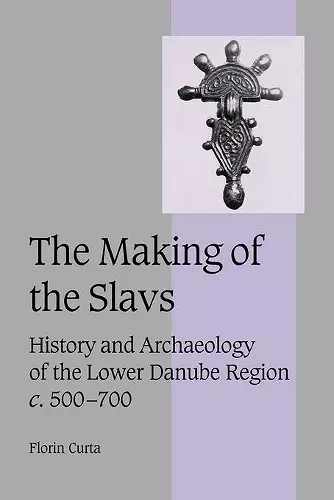The Making of the Slavs
History and Archaeology of the Lower Danube Region, c.500–700
Format:Paperback
Publisher:Cambridge University Press
Published:30th Apr '07
Currently unavailable, and unfortunately no date known when it will be back
This paperback is available in another edition too:
- Hardback£133.00(9780521802024)

An alternative approach to Slavic ethnicity in south-eastern Europe c. 500–c. 700.
This book offers an alternative approach to the problem of Slavic ethnicity in south-eastern Europe between c. 500 and c. 700. The author shows how Byzantine authors 'invented' the Slavs, rejects the idea of Slavic migration, and shows that 'the Slavs' were the product of the frontier.This book offers an alternative approach to the problem of Slavic ethnicity in south-eastern Europe between c. 500 and c. 700, from the perspective of current anthropological theories. The conceptual emphasis here is on the relation between material culture and ethnicity. The author demonstrates that the history of the Sclavenes and the Antes begins only at around 500 AD. He also points to the significance of the archaeological evidence, which suggests that specific artefacts may have been used as identity markers. This evidence also indicates the role of local leaders in building group boundaries and in leading successful raids across the Danube. Because of these military and political developments, Byzantine authors began employing names such as Sclavines and Antes in order to make sense of the process of group identification that was taking place north of the Danube frontier. Slavic ethnicity is therefore shown to be a Byzantine invention.
'The book is notable for the emphasis on the study of the material culture as evidence of cultural process … the novel and thorough approach of the book has a great deal to offer the scholar interested in many aspects of the history and historiography of early Medieval eastern and southeastern Europe and the study of past ethnicities.' Slavic Review
'… the author offers quite a coherent and convincing approach … not only intriguing, but quite inspiring … this new study of early Slavic history is a particularly successful attempt to open new perspectives for dealing with the important challenges of history.' Comitatus
'… brilliant … this book is a significant contribution to medieval history and an outstanding achievement in Slavic studies.' Journal of Interdisciplinary History
'The hypothesis that Curta advances is extremely neat …' International History Review
ISBN: 9780521036153
Dimensions: 226mm x 150mm x 30mm
Weight: 734g
496 pages